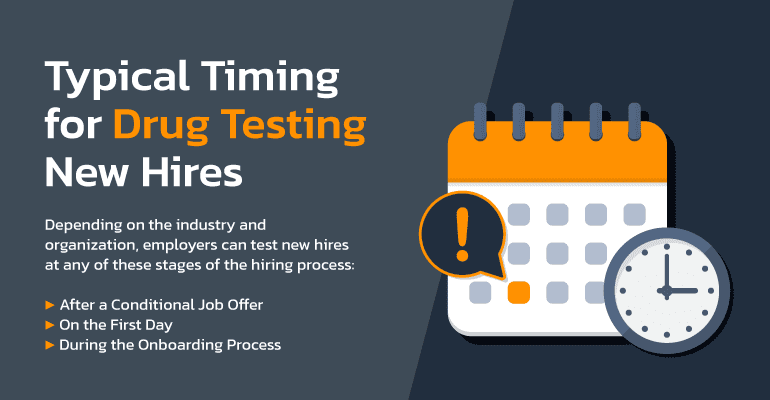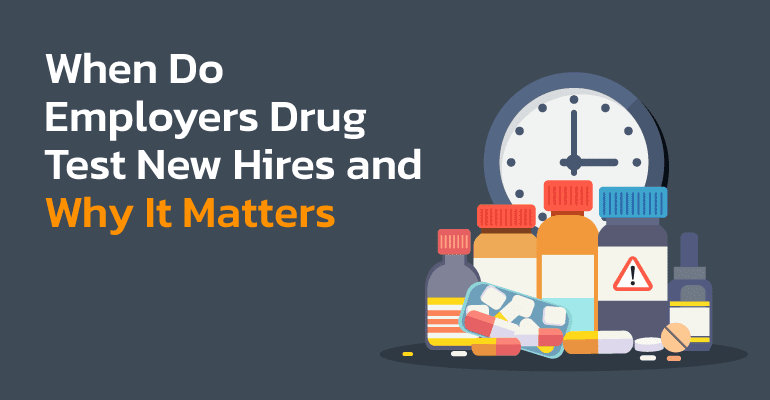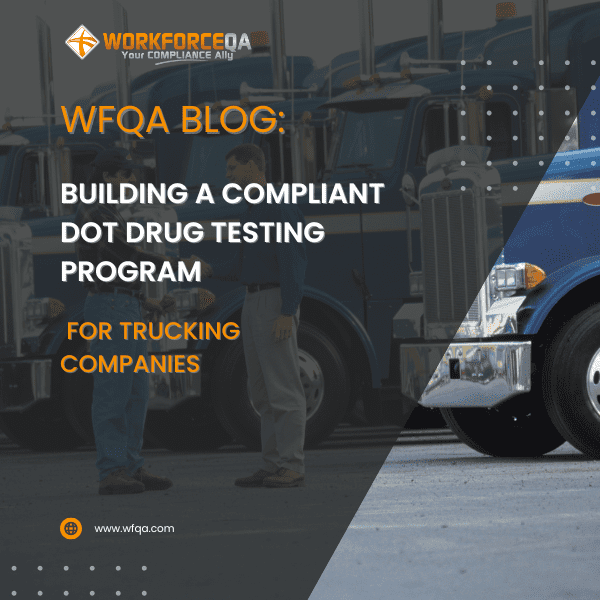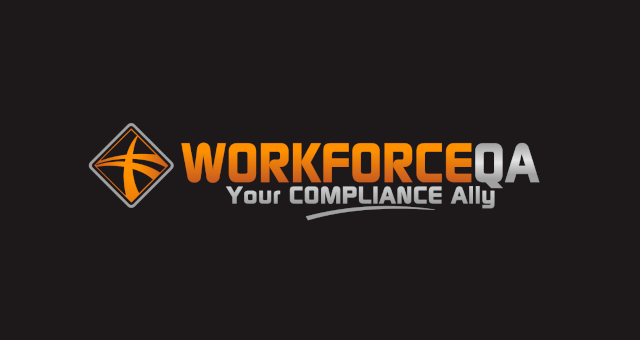Understanding when employers drug test new hires helps both job seekers and organizations navigate the hiring process with confidence.
Pre-employment drug testing plays a crucial role in maintaining a safe, compliant, and productive workplace. It helps employers identify candidates who are fit for duty, reduces the risk of workplace accidents, and demonstrates a company’s commitment to employee well-being.
From timing and testing methods to compliance best practices, this comprehensive guide explains everything employers need to know and how WorkforceQA’s Drug and Alcohol Testing Services can help you build an efficient, compliant, and scalable testing program.
What Is Pre-Employment Drug Testing?
Pre-employment drug testing is the process of screening job candidates for illegal drugs, alcohol, or the misuse of prescription medications before officially hiring them.
Employers use these tests to:
- Promote safe working conditions
- Maintain compliance with state and federal laws
- Hire reliable, trustworthy, and productive employees
Testing requirements vary depending on the industry and jurisdiction, but most employers follow standardized procedures set by federal or state agencies to ensure fairness and accuracy.
Key Reasons for Testing New Hires
- Workplace Safety and Risk Reduction: Drug-free environments reduce the likelihood of accidents, injuries, and safety incidents — especially in transportation, construction, healthcare, and other high-risk industries.
- Regulatory Compliance: Certain sectors, particularly those regulated by the Department of Transportation (DOT) or Occupational Safety and Health Administration (OSHA), require mandatory pre-employment drug testing to protect public safety.
- Promoting a Drug-Free Workplace: Regular testing fosters a culture of safety, accountability, and responsibility, thereby setting the tone for a professional and compliant workforce.
- Liability Prevention: Pre-employment drug testing demonstrates due diligence and helps shield employers from negligent hiring claims in the event of an accident or safety violation.
When Do Employers Drug Test New Hires?
The timing of pre-employment drug testing varies by organization, but most follow one of three common approaches.
1. After a Conditional Job Offer
In most cases, testing occurs after a conditional offer of employment has been extended. This means the offer is contingent upon the candidate passing the required screenings, including a drug test and background check.
Typical process:
- The candidate is notified within 24–48 hours to complete the test.
- The test is performed at a certified clinic or collection site.
- Results are verified by a Medical Review Officer (MRO) before being shared with HR.
This approach ensures compliance with the state or federal drug testing or privacy law, as candidates must provide written consent prior to testing commencing.
2. During the Onboarding Process
Some employers include drug testing as part of the onboarding process, typically scheduled after the offer is accepted but before the employee’s official start date.
This is especially common for:
- Remote or hybrid employees
- High-volume hiring periods
- Multi-location organizations
Utilizing a third-party provider like WorkforceQA enables centralized scheduling and ensures consistent compliance across all sites.
3. On the First Day of Employment
Although less common, some employers conduct testing on the employee’s first day, typically during orientation or initial training.
This approach is best for:
- Companies with on-site collection capabilities
- Roles where immediate testing is needed before granting job access
Employers must explicitly state this requirement in job postings to stay legally compliant.

Factors That Influence When Employers Drug Test New Hires
Several factors determine when and how testing is conducted, including industry regulations, state laws, and company policies.
Industry Requirements for Drug and Alcohol Testing
Certain industries, especially those with safety-sensitive roles, are legally required to conduct pre-employment and ongoing drug and alcohol testing. These programs help ensure employees are fit for duty, safeguard public safety, and ensure compliance with federal and state regulations.
WorkforceQA partners with organizations across various regulated and high-compliance industries including:
- Transportation and Trucking – regulated by FMCSA
- Aviation and Airlines – under FAA requirements
- Transit and Rail – regulated by FTA and FRA
- Pipeline and Maritime – under PHMSA and USCG oversight
- Healthcare and Pharmaceuticals
- Construction, Manufacturing, and Energy
Under DOT regulations, pre-employment drug tests are mandatory for all employees before they can perform any safety-sensitive function.
WorkforceQA’s DOT program management streamlines the process through nationwide coordination, random pool management, and audit-ready documentation, ensuring compliance across all transportation modes.
For more details, see:
- Building a Compliant DOT Drug Testing Program for Trucking Companies
- DOT Pre-Employment Drug Test Requirements
- NRPM Adding Fentanyl to the DOT Drug Testing Panel
State and Federal Laws Governing Drug and Alcohol Testing
Workplace drug and alcohol testing is governed by a complex mix of federal and state laws.
While the DOT sets federal testing requirements for safety-sensitive roles, many states impose additional rules that affect both DOT and non-DOT employers.
Common State Law Variations
- Advance Notice and Consent: Employers may be required to provide written notice or obtain signed consent before testing.
- Marijuana Testing Restrictions: Certain states limit or prohibit testing for marijuana, especially for off-duty use. (These do not apply to DOT-regulated programs.)
- Use of Results in Employment Decisions: Some states mandate confirmatory testing or allow candidates to contest results.
- Data Privacy and Security: States increasingly require secure handling, limited access, and strict confidentiality of testing records.
For multi-state employers, maintaining compliance can be a significant challenge.
That’s why WorkforceQA provides expert policy development, compliance management, and program support – ensuring consistency and legal alignment nationwide.
Company Policy and Program Development
Every organization should have a written Drug-Free Workplace Policy included in its Employee Handbook, which defines testing procedures, timing, responsibilities, and consequences for positive results.
A strong policy helps:
- Maintain consistency and fairness across departments
- Support OSHA, DOT, and state compliance
- Clearly communicate expectations
- Protect against legal risk
WorkforceQA assists employers in developing, reviewing, and updating policies to ensure compliance with federal, state, and industry-specific standards, including those outlined in the FCRA, ADA, and DOT regulations.
Our TRAQ platform allows organizations with multiple locations to standardize testing schedules and maintain consistency across their workforce.
Common Types of Pre-Employment Drug Tests
Employers can select from various drug testing methods, each tailored to specific objectives, budget considerations, and detection needs. The chosen test type often depends on industry rules, workplace safety requirements, and expected turnaround times.
However, under Department of Transportation (DOT) regulations, only urine drug testing and breath alcohol testing are currently approved for use in federally regulated, safety-sensitive positions.
WorkforceQA offers expert guidance to help employers select the most suitable testing methods for both DOT and non-DOT programs, ensuring compliance, accuracy, and consistency across all locations.
Urine Testing
- Most common and cost-effective method
- Detects recent drug use typically within 1–3 days, extending up to a week or more for some substances (e.g., THC in frequent users).
- Includes tamper-detection methods such as temperature and adulteration checks. How tampering is detected
Hair Testing
- Detects drug use over a longer period (up to 90 days).
- Provides a tamper-proof option, ensuring highly reliable results.
- Suitable for identifying patterns of habitual use.
Saliva (Oral Fluid) Testing
- Quick and non-invasive.
- Detects recent drug use (usually within 24–48 hours).
- Commonly used for on-site testing and random screenings.
Blood Testing
- The most invasive and expensive option.
- Short detection window (several hours to a few days).
- Typically, not used in workplace testing, but used in specific legal or emergency testing situations
Breath Alcohol Testing
- Measures alcohol concentration (BAC) in the blood.
- Used to detect alcohol impairment in real-time, especially for safety-sensitive positions, post-accident, or when there is reasonable suspicion
- Used in DOT random testing
WorkforceQA partners with employers to develop comprehensive drug and alcohol testing programs that incorporate DOT-approved methods along with additional non-DOT options as needed, ensuring compliance, safety, and reliable results for every workforce situation.
Reasons for Employee Drug Screening
Employee drug and alcohol testing is essential for ensuring workplace safety, regulatory adherence, and maintaining organizational integrity.
Below are the most common types of testing and why they matter:
Pre-Employment Testing
Identifies dependable and safety-conscious candidates, ensuring regulatory compliance.
Random Testing
Deters substance abuse through unannounced testing, helping maintain a drug-free environment.
Reasonable Suspicion Testing
Conducted when trained supervisors observe signs of impairment such as erratic behavior, slurred speech, or the smell of alcohol. WorkforceQA provides supervisor training to ensure accurate identification and documentation.
Post-Accident Testing
Determines whether drugs or alcohol contributed to a workplace incident. WorkforceQA offers 24/7/365 post-accident coordination to ensure timely and compliant testing.
Return-to-Duty and Follow-Up Testing
Required after an employee completes a rehabilitation program or returns from a positive test. Ongoing testing supports recovery and reinforces safety.
How Employers Conduct Pre-Employment Drug Testing
Direct Testing at Clinics
Some employers coordinate testing in-house, including scheduling, sample collection, and tracking the chain of custody.
Typical process:
- Candidate receives scheduling instructions.
- Sample is collected following strict chain-of-custody procedures.
- Lab screens for specific substances.
- Results are reported to HR.
Employers who coordinate drug testing directly through clinics must manually handle scheduling, collection, and chain-of-custody tracking.
This approach often results in inconsistent documentation and inadequate oversight, particularly across multiple locations.
Without a qualified Medical Review Officer (MRO), employers risk making decisions based on unverified results, which can expose them to legal liability—particularly when legitimate prescriptions are involved.
Third-Party Administrator (TPA) Services
Most employers now partner with third-party providers, such as WorkforceQA, to manage the complexities of testing logistics, compliance, and reporting.
WorkforceQA provides:
- A nationwide network of certified collection sites
- Fast, accurate turnaround times
- Centralized compliance management via the TRAQ platform
- Automated result delivery and secure record-keeping
- MRO oversight for all non-negative results
By consolidating testing through WorkforceQA, employers gain efficiency, compliance, and peace of mind knowing their program meets DOT, HHS, and state-specific standards.
Legal Considerations and Compliance
Consent and Disclosure
Employers must obtain written consent before conducting a drug test. Consent forms must outline:
- Type of test
- Purpose and timing
- Consequences of refusal or failure
FCRA and State Regulations
When drug testing is conducted as part of a background check through a third-party screening company, the process is governed by the Fair Credit Reporting Act (FCRA). This federal law ensures that candidates are treated fairly when information from a background report, including drug test results, is used to make employment decisions.
Under the FCRA, employers must:
- Provide written notice that a background check (which may include a drug test) will be conducted by a third-party screening provider such as WorkforceQA.
- Obtain written consent from the individual before the background check begins.
- Provide pre-adverse and adverse action notices if any part of the report — including drug testing results — influences a hiring, promotion, or termination decision.
- Maintain secure and confidential handling of all screening and testing data.
In addition to federal requirements, many state laws impose further privacy and employment protections, regulating how, when, and under what circumstances drug test results may be shared, accessed, or stored.
WorkforceQA ensures full FCRA and state law compliance, managing everything from disclosure to secure result delivery and retention.
For more, read What Is Included in a Background Check and FCRA Background Check Compliance
DOT and Safety-Sensitive Roles
The Department of Transportation (DOT) enforces mandatory testing for all employees in safety-sensitive positions across multiple modes of transportation.
WorkforceQA ensures compliance with all DOT agency requirements:
- FMCSA – Trucking and commercial driving
- FAA – Aviation operations
- FTA – Public transit systems
- FRA – Rail operations
- PHMSA – Pipeline transport
- USCG – Maritime operations
Employers must comply with mandatory testing requirements, including:
- Pre-employment drug testing before an individual performs any safety-sensitive duties
- Random rate set by DOT agency
- Post-accident, reasonable suspicion, and return-to-duty testing to ensure ongoing compliance
With WorkforceQA’s DOT program management, employers can easily coordinate all required testing, manage random pools, and maintain audit-ready documentation across every DOT mode — all through one secure, centralized platform.
For comprehensive DOT program guidance, see WorkforceQA’s Trucking Compliance Services.
Best Practices for Employers
Establishing a clear, compliant, and consistent drug and alcohol testing program is crucial for safeguarding your workforce and organization. The following best practices promote transparency, fairness, and full regulatory adherence, while building trust within your team.
Establishing a Company Policy and Employee Handbook
Every employer should maintain a written Drug and Alcohol Testing Policy, which should be included in the Employee Handbook.
A strong company policy should:
- Define testing procedures, timing, and testing types (pre-employment, random, post-accident, etc.)
- Outline employee rights and responsibilities
- Specify consequences for policy violations
- Include information about confidentiality and data handling
- Reference relevant laws and DOT or state compliance standards
WorkforceQA assists employers in developing, reviewing, and updating policies and handbooks to ensure they align with federal and state laws, as well as OSHA, FCRA, ADA, and DOT requirements.
Clear Communication with Candidates
Transparency builds trust and enhances the candidate’s experience. Employers should clearly communicate:
- When and how testing will occur
- Which substances are included in the testing panel
- How long results typically take
Being upfront about testing expectations helps prevent confusion, promotes fairness, and supports a culture of accountability and safety.
Maintaining Fairness and Confidentiality
Employers must treat all testing information with discretion and in accordance with employee privacy laws.
- Only authorized HR or compliance personnel should access results
- Employees should be allowed to explain valid medical prescriptions
- Testing procedures must be applied consistently to all candidates and employees
Partner with WorkforceQA Experts
Drug testing new hires is one of the most effective ways to promote workplace safety, compliance, and accountability. WorkforceQA helps employers design and manage compliant, scalable, and efficient testing programs tailored to their workforce and industry.
Our services include:
- Real-time reporting dashboards and compliance monitoring
- Mobile collections and on-site testing for convenience
- Full FCRA, ADA, and DOT compliance oversight
- Expert guidance for policy development and handbook inclusion
- Nationwide clinic and on-site collection options
- DOT-compliant and non-DOT testing
- In-house MRO
- Streamlined candidate scheduling and reporting
- Integrated background screening solutions
Pre-employment drug testing is a crucial component of establishing a safe, compliant, and reliable workforce. Understanding when and how testing should occur helps employers make informed, confident hiring decisions while maintaining full legal compliance.
With WorkforceQA’s nationwide drug and alcohol testing services, employers gain access to:
- 24/7 coordination and support
- Certified laboratories and collection sites
- Centralized compliance management through TRAQ
- Expert guidance for DOT and non-DOT programs
WorkforceQA streamlines drug testing — helping your organization hire safely, operate efficiently, and stay fully compliant.Learn about WFQA Drug and Alcohol Testing Services to discover how our trusted team can help you test new hires safely, efficiently, and in full compliance with state and federal laws.





